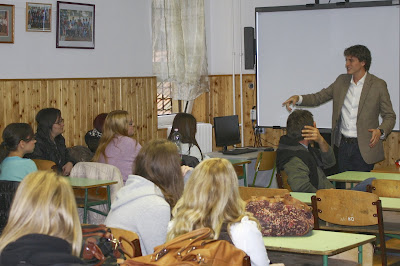Previously, I've written with some fondness for the pigs who live on the other side of my bedroom wall. On Tuesday morning, two of these pork-loined friends became part of a Hungarian tradition: an annual pig slaughter.
Why we did this on a Tuesday I don't know. But I stayed home from the Children's House, my host brother didn't go to school, and my host dad had the day off of work. This was an all day job.
Our work started at 7:30 in the pig pen. When the animal started screaming, the estranged brother of the host dad from across the street came running to help; foe became friend and it was a full family affair.
I'll spare you most of the details from that point. I'm expecting a good spike in blog traffic since I'm sure some groups are trolling the internet for phrases like "pig slaughter". But really, the process was fascinating and every last piece of the pig was used in some way. Everyone had a job to do which they pursued with haste and precision.
They say that the two things you never want to see made are laws and sausage. At this point, I'm not sure I have a problem with either. I'm not sure what that says about me.
For now, I'll let the pictures do the talking about my first Hungarian pig kill.
Why we did this on a Tuesday I don't know. But I stayed home from the Children's House, my host brother didn't go to school, and my host dad had the day off of work. This was an all day job.
Our work started at 7:30 in the pig pen. When the animal started screaming, the estranged brother of the host dad from across the street came running to help; foe became friend and it was a full family affair.
I'll spare you most of the details from that point. I'm expecting a good spike in blog traffic since I'm sure some groups are trolling the internet for phrases like "pig slaughter". But really, the process was fascinating and every last piece of the pig was used in some way. Everyone had a job to do which they pursued with haste and precision.
They say that the two things you never want to see made are laws and sausage. At this point, I'm not sure I have a problem with either. I'm not sure what that says about me.
For now, I'll let the pictures do the talking about my first Hungarian pig kill.
After the pig is dead, the first job is to burn off the hair and prepare the skin.













































